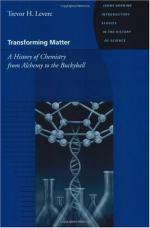|
This section contains 337 words (approx. 2 pages at 300 words per page) |
Alchemy is a precursor of modern chemistry. It represented the first systematic attempts of people to try to understand the workings of the universe without recourse to religion.
There were two main driving forces behind the "science" of alchemy—the search for the fountain of youth, whether it be a physical place or a potion capable of restoring and maintaining youth, and more famously a method of transforming base metals into gold. Alchemy as such achieved notoriety from its pre-eminence in fourteenth century Europe. It is true that stories of, and searches for, the two main tenets of alchemy had been around for many years previously, particularly in China and Egypt, but it was not until the middle ages that European nobles sponsored alchemists, thus making it a growth industry.
The search for a potion for eternal life was actually responsible for the premature deaths of many practitioners of the art of alchemy. The consumption of compounds of antimony, mercury or arsenic was a common path in the search of everlasting life. Unfortunately these compounds are all poisonous and they very quickly had the opposite effect to that desired.
The transmutation of other metals into gold was attempted by the alchemists using a wide range of chemical and physical processes. The transmutation of gold is now possible, and it occurs as part of the radioactive decay of material and can be brought about by bombardment with a metal with a particle accelerator, unfortunately these materials are so radioactive as to be instantly deadly. It is interesting to note that if the ancient alchemists had been successful in transforming base metals, such as lead, into gold then the value of gold itself would have plummeted, leaving the inventor of the process no better off, financially.
Very few alchemists names are now known to us due to their singular lack of success, but one who has been recorded in history is John Dee who was alchemist to Queen Elizabeth I of England, in the sixteenth century.
|
This section contains 337 words (approx. 2 pages at 300 words per page) |


